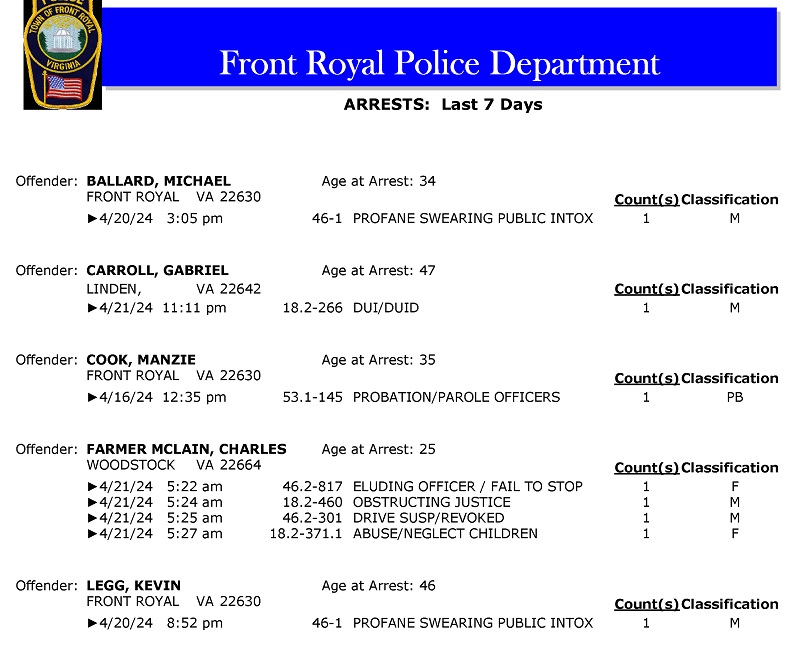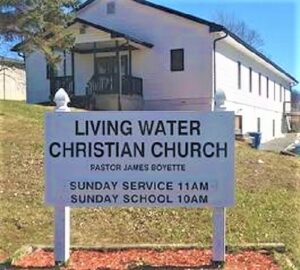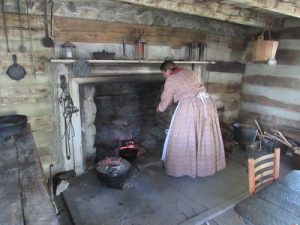Halloween Glow Throw

11 E 3rd St | Front Royal VA 22630
Bring your best costumes and GLOW throw with us! Trick or treat, throw axes and have an amazing Halloween with SVAXETHROWINGCO! KID friendly!
- Make your reservation today, spots will fill up fast: www.svaxethrowingco.com
- Fill out our waiver prior to your arrival: waiver.smartwaiver.com


Town Talk
Connie Marshner Unveils the Eastern Mediterranean Origins of Irish Christianity in New Book
11 E 3rd St | Front Royal VA 22630
In a recent interview at the Royal Examiner, Connie Marshner, the newly elected chairman of the Planning Commission and a noted author, delved into the fascinating themes of her latest book, “Monastery and High Cross: The Forgotten Eastern Roots of Irish Christianity.” The book explores Ireland’s early Christian history, influenced significantly by Eastern Mediterranean cultures, particularly from Alexandria, Egypt, and Armenia.
Marshner’s research, which spanned four years, including two for her master’s degree and two dedicated solely to this project, reveals that St. Patrick was not the first Christian in Ireland. This distinction sets the stage for her comprehensive study of the less-known yet profoundly impactful connections between Irish and Eastern Christian practices.
The cover of her book, adorned with a Celtic cross set against a backdrop of Egyptian hieroglyphs, visually encapsulates the blend of cultural influences that define early Irish Christianity. Marshner states this period was marked by unity among Christians before the divisions into Catholic, Protestant, or Orthodox beliefs. Her book traces these connections back to the third century, highlighting the significant role of Egyptian monks who sought solitude and spirituality away from the burgeoning theological debates in Alexandria, a pivotal intellectual hub of early Christianity.
Marshner pointed out architectural and archaeological similarities, such as the beehive-shaped, dry stone huts on Skellig Michael, which resemble structures found in the Egyptian desert. These similarities support her thesis of a trans-Mediterranean connection to Ireland, bypassing the Roman influences due to Ireland’s non-incorporation into the Roman Empire.
The scholarly work in “Monastery and High Cross” also draws attention to the survival of apocryphal gospels in Ireland, texts that were forgotten or ignored elsewhere in Europe. This aspect underscores the unique preservation of ancient religious texts and practices in Irish monastic life, which remained vibrant and distinct from the broader Christian practices of the time.
Connie Marshner’s dedication to uncovering these historical connections is evident in her rigorous compilation of evidence and her detailed discussion of the implications of these findings for understanding the broader spectrum of Christian history. She hopes this book will inspire future scholars to explore the rich yet under-examined field of Hiberno-Coptic studies.
“Monastery and High Cross” is available on Amazon and SophiaPress.com, promising readers a deep dive into the entwined histories of Eastern and Irish Christianity, brought to life through Marshner’s passionate research and compelling narrative.
Local News
Warren County Virginia Sheriff’s Office Rallies Support for Deputy Whose Home Was Severely Damaged by a Fire
11 E 3rd St | Front Royal VA 22630
In an urgent Facebook post on Monday, April 22, Sheriff Crystal Cline alerted the community to the plight of a deputy whose home was severely damaged by a fire that day.
“This morning, we were reminded of the unpredictable challenges that life can throw at us,” she wrote. “One of my deputies faced a heartbreaking tragedy when a fire severely damaged his home, resulting in the loss of everything he held dear, including his beloved pet.
“This deputy has lived his life on the frontlines—he served in the Army, then as a volunteer and professional firefighter, and now as a deputy with the Warren County Sheriff’s Office serving our community.
“Your support, whether through prayer, donations, or financial contributions, will help provide the immediate needs of shelter, clothing, and other essentials during this critical time. The Warren County Sheriff’s Office (200 Skyline Vista Drive, Front Royal, VA) will be a drop-off location for any physical items or financial donations—ask for Jenn.
I appreciate your kindness, generosity, and support. We are more than a community; we are a FAMILY!”
Out of respect for the deputy, his identity was not revealed. Even so, the sheriff’s Facebook page has been inundated by people who want to help. Many types of donations are welcome, as the sheriff emphasized, and for those specifically wanting to make online financial contributions, a link is provided on the WCSO’s page. Michael Glavis of the WCSO has organized that site for raising funds, the “Sheriff Deputy House Fire Relief Fund.” Glavis considers the deputy a dear friend and work colleague. “He has given blood and sweat for others, and now I’m asking for everyone to give a little to help him and his family through the process of recovery,” Glavis said.
Local Government
Airing of Differences in Town Council Regular Meeting Leads to Unanimous Vote to Extend Out-of-Town Service to Catholic Diocese
11 E 3rd St | Front Royal VA 22630
Every meeting of the Town Council has a scarlet thread weaving through a thicket of information. On Monday, April 22, at a regular meeting, starting at 7 p.m. in the Warren County Government Center on 220 North Commerce Avenue, the items threading the labyrinth were related to an out-of-town utility connection contract with the Catholic Diocese of Arlington for 0 Criser Road.


Town Council meets for regular meeting on the evening of April 22 at the Warren County Government Center.
Sensing what is coming next is an imprecise art in government and the status of the Diocese’s application, suffering much discussion throughout multiple work sessions of the council, lingered in a state of irresolution as it was unclear whether the church body would ultimately receive water and septic service from the town at their out-of-town location on West Criser Road, where they plan to develop a sanctuary as well as an auxiliary building to serve as a gymnasium. Still, on Monday night, to use Councilman Bruce Rappaport’s language, the issue reached the end of its road. Even if the council does not work out a boundary-line adjustment of Town corporate limits to include the parcel at 0 West Criser Road, even if the council cannot, therefore, require the applicant to build a sidewalk in accordance with the rules that would govern the development of a parcel within Town limits; and even if members of the council continue to disagree amongst themselves about the coulda, woulda, shoulda pertaining to the Diocese’ offer to offset the cost of a sidewalk, the Town can still extend service to the church body. And they did in a unanimous vote.
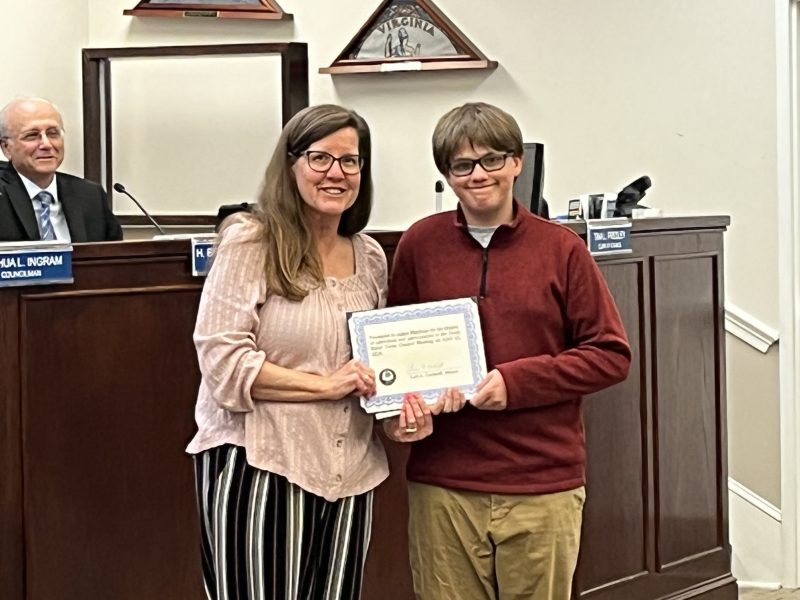

Jaden Matthiae, son of Michelle Matthiae and planning commissioner Brian Matthiae, receives a gift certificate from Mayor Lori Cockrell after he led the gathering in the pledge of allegiance.
Having placed 0 Criser Road on a list of areas outside of town that may receive service earlier in the evening in a unanimous vote, the council proceeded later, before the vote on approving the application, to submit for the record their varying views on whether a sidewalk could have been a part of the deal. A sidewalk on West Criser Road is something that all the members of the Town Council, as well as the town manager, desire passionately, as safety conditions are currently less than ideal for school children walking on that road. A parcel on that road might be developed in a way that would possibly increase pedestrian traffic, but this only serves to cement that desire; however, there are different opinions about methodology.


Before the meeting, there was an equipment display in the Government Center’s parking lot so the public could see their tax dollars at work. Above: Town Manager Joe Waltz tries out the Town’s brand-new rubber tire loader, valued at 212K, which will serve with snow removal and assist in water and septic maintenance. Below: Manager of Vehicle/Equipment Maintenance Donald McPaters stands beside a beauty, a brand-new asphalt roller valued at 74K.


The one hundred and twenty-some thousand dollars that the Diocese offered to the Town to offset the cost of a sidewalk could have, in Councilman Glenn Wood’s view, solved the problem. However, the Diocese did not conduct a study of what the sidewalk would ultimately cost, and according to the information available to Town staff, the ultimate cost, including all the engineering concerns, would be upwards of two million dollars. In her statement at the meeting, Councilwoman Amber Morris strongly underlined those engineering concerns, specifically the utilities that would have to be moved to make that sidewalk a reality. Town Manager Joe Waltz emphasized the inadequacy of one hundred twenty-some thousand dollars. It is his view that the real priority on West Criser Road is installing a sidewalk between Skyline Vista Drive and Route 340, where there is not even a bike lane to offset the safety concern.
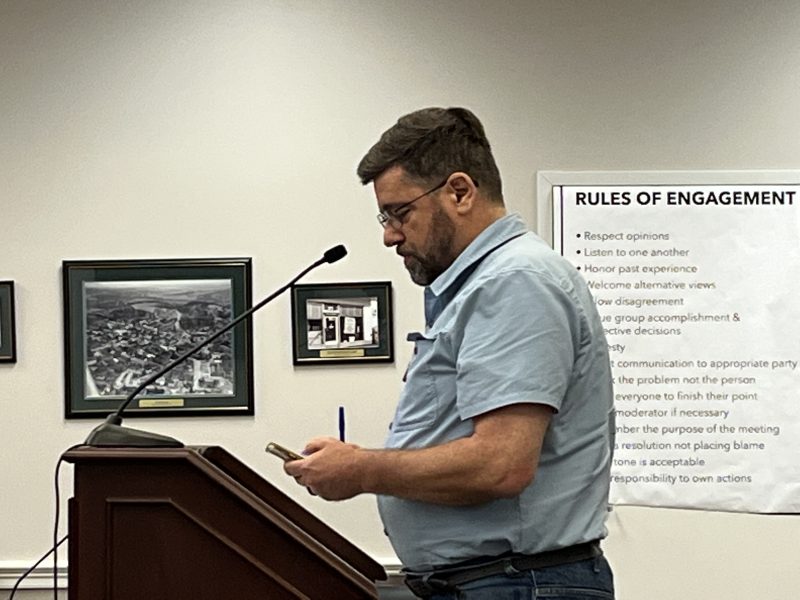

Under public comments, Tom Sayre stands up to address the council on what he perceives to be a pressing need for fiscal transparency, referencing a case from 2022 in which funds were appropriated under circumstances that Town Attorney George Sonnett explained were confidential after Councilwoman Amber Morris interrupted Sayre’s comment to call a point of order. The subject was what she called “alleged conduct,” and in her view, it would be inappropriate for the council to engage in such a comment in the context of a regular meeting. Sonnett encouraged the council not to engage the comment. They did not.
The word on the street is that the gymnasium will precede the sanctuary at 0 Criser Road. The intersection of Luray Avenue and West Main Street is a place of force on Sunday mornings, with much vehicular as well as pedestrian traffic, where St. John the Baptist Church is located across from Maddox Funeral Home. A secondary chapel could relieve that traffic somewhat and the gymnasium could be a resource for the Catholic homeschool community. It certainly sounds like a good thing for everybody.
Click here to watch the Front Royal Town Council Meeting of April 22, 2024.
Arrest Logs
POLICE: 7 Day FRPD Arrest Report 4/22/2024
Job Market
Embracing the Future: The Rise of Collaborative Workspaces
11 E 3rd St | Front Royal VA 22630
In the ever-evolving landscape of the modern workplace, collaborative workspaces have become a beacon of innovation, productivity, and community. As companies strive to adapt to the changing needs of their workforce and the demands of the market, these dynamic environments offer a solution that fosters creativity, teamwork, and a sense of shared purpose. Here’s why saying “yes” to collaborative workspaces can be a game-changer for businesses and employees alike.
Boosted Productivity Through Shared Spaces
Collaborative workspaces are designed to break down the physical barriers that traditional office layouts often impose. By promoting an open and flexible environment, these spaces encourage spontaneous discussions, idea sharing, and cross-departmental collaboration. The result? A noticeable increase in productivity as employees feel more engaged and motivated to innovate.
Enhanced Collaboration and Communication
The essence of collaborative workspaces lies in their ability to bring people together. Gone are the days of working in isolation within the confines of a cubicle. Instead, these environments are built on the principle of shared spaces where interaction and cooperation are encouraged and integral to the work process. This setup naturally improves collaboration and communication among team members, leading to more cohesive and efficient workflows.
A Stronger Sense of Community and Belonging
One of the most significant benefits of collaborative workspaces is the sense of community they cultivate. Sharing a physical space allows employees to connect on a more personal level, fostering relationships that go beyond mere professional interactions. This sense of belonging not only enhances job satisfaction but also strengthens the company’s overall culture, making it a more attractive workplace.
Flexibility to Adapt and Innovate
Collaborative workspaces offer unparalleled flexibility, allowing companies to tailor the environment to the specific needs of their teams and projects. Whether it’s creating open spaces for brainstorming sessions, designing quiet zones for focused work, or setting up informal meeting areas, these workspaces can evolve to support various working styles and tasks. This adaptability is key in today’s fast-paced business world, where agility and responsiveness can make all the difference.
A New Paradigm for the Modern Workplace
As businesses navigate the challenges and opportunities of the 21st century, collaborative workspaces stand out as a powerful tool for fostering innovation, productivity, and a strong corporate culture. By embracing these environments, companies enhance their operational efficiency and create a more fulfilling and engaging workplace for their employees. The future of work is collaborative, and it’s time for businesses to embrace this shift and unlock the potential of their teams.
Interesting Things to Know
Groundbreaking Gene Therapy Brings Hope to Deaf Children
11 E 3rd St | Front Royal VA 22630
In an extraordinary leap forward for medical science, a team of researchers from Harvard Medical School and the Massachusetts Eye and Ear Infirmary has pioneered a gene therapy trial that promises a world of change for children born deaf. This clinical trial in China focused on children aged 1 to 7, all born completely deaf due to an inherited gene mutation.
Gene therapy, a revolutionary technique, works by inserting normal genes into cells to replace missing or defective ones. The deafness of the children in this trial was traced to a specific condition known as DFNB9, which was attributed to a mutation in the OTOF gene. This gene is crucial as it encodes otoferlin, a protein essential for transmitting sound to the inner ear. Without functional otoferlin, sound signals cannot reach the brain, resulting in total deafness. However, it’s important to note that this condition doesn’t cause any physical damage to the inner ear, making these children ideal candidates for gene therapy.
Five of the six children who underwent this pioneering treatment experienced significant improvements within 26 weeks. These children, who had lived in silence since birth, were suddenly able to understand and respond to speech and even recognize speech amidst noisy environments. Unfortunately, one child did not show any improvement, and researchers are still trying to understand why.
This trial not only opens new avenues for treating deafness but also kindles hope for advancements in gene therapy for various other conditions. The success observed in five out of six participants marks a significant milestone in medical science, showcasing the potential of gene therapy as a life-changing treatment for individuals with genetic disorders. As this research continues to evolve, it may pave the way for addressing other forms of deafness and potentially a myriad of genetic conditions affecting people around the globe.
